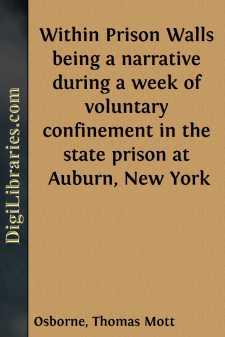Categories
- Antiques & Collectibles 13
- Architecture 36
- Art 48
- Bibles 22
- Biography & Autobiography 813
- Body, Mind & Spirit 141
- Business & Economics 28
- Children's Books 12
- Children's Fiction 9
- Computers 4
- Cooking 94
- Crafts & Hobbies 4
- Drama 346
- Education 46
- Family & Relationships 57
- Fiction 11826
- Games 19
- Gardening 17
- Health & Fitness 34
- History 1377
- House & Home 1
- Humor 147
- Juvenile Fiction 1873
- Juvenile Nonfiction 202
- Language Arts & Disciplines 88
- Law 16
- Literary Collections 686
- Literary Criticism 179
- Mathematics 13
- Medical 41
- Music 40
- Nature 179
- Non-Classifiable 1768
- Performing Arts 7
- Periodicals 1453
- Philosophy 64
- Photography 2
- Poetry 896
- Political Science 203
- Psychology 42
- Reference 154
- Religion 513
- Science 126
- Self-Help 83
- Social Science 81
- Sports & Recreation 34
- Study Aids 3
- Technology & Engineering 59
- Transportation 23
- Travel 463
- True Crime 29
Within Prison Walls being a narrative during a week of voluntary confinement in the state prison at Auburn, New York
Description:
Excerpt
CHAPTER I
WHY I WENT TO PRISON
Many years back, in my early boyhood, I was taken through Auburn Prison. It has always been the main object of interest in our town, and I was a small sized unit in a party of sightseers. No incident of childhood made a more vivid impression upon me. The dark, scowling faces bent over their tasks; the hideous striped clothing, which carried with it an unexplainable sense of shame; the ugly close cropped heads and shaven faces; the horrible sinuous lines of outcast humanity crawling along in the dreadful lockstep; the whole thing aroused such terror in my imagination that I never recovered from the painful impression. All the nightmares and evil dreams of my childhood centered about the figure of an escaped convict. He chased me along dark streets, where I was unable to run fast or cry aloud; he peeked through windows at me as I lay in bed, even after the shades had been pinned close to escape his evil eye; as I ascended a flight of stairs in dreamland and looked back, he would come creeping through an open door, holding a long knife in his hand, while my mother all unconscious of danger sat reading under the shaded library lamp; he was a visitor frequent enough to make night hideous for a time, and it was many long years before he took a departure which I trust is final.
After this early experience I carefully avoided the Prison. Its gray stone walls frowned from across the street every time I departed or arrived on a New York Central train, but I made no effort to go again inside. In fact I persistently refused to join my friends whenever they made a visit there; once had been quite enough.
So it was not until many years afterward that I again passed within prison walls. Then my official connection with the Junior Republic and its successful training of wild and mischievous boys brought me in touch with the Prison System. I had been interested in the Elmira Reformatory and had visited Mr. Brockway, the superintendent of that institution. I became acquainted, quite by chance, with a certain prisoner in Sing Sing, and through him interested in other prisoners, there and in Auburn. In due time, I began to appreciate the importance of the general Prison Problem and the difficulties of its solution. Also I felt that my experience in the Junior Republic had given me a possible clew to that solution.
Thus I was drawn to the prison almost in spite of myself; and, becoming more and more interested, I felt that there was great need of some one’s making a study at first hand—some one sympathetic but not sentimental—of the thoughts and habits of the men whom the state holds in confinement. It is easy to read a textbook on civil government and then fancy we know exactly how the administration of a state is conducted; but the actual facts of practical politics are often miles asunder from the textbook theory. In the same way “the Criminal” has been extensively studied, and deductions as to his instincts, habits and character drawn from the measurements of his ears and nose; but I wanted to get acquainted with the man himself, the man behind the statistics.
So the idea of some day entering prison and actually living the life of a convict first occurred to me more than three years ago. Talking with a friend, after his release from prison, concerning his own experience and the need of changes in the System, I brought forward the idea that it was impossible for those of us on the outside to deal in full sympathy and understanding with the man within the walls until we had come in close personal contact with him, and had had something like a physical experience of similar conditions. We discussed how the thing could be done in case the circumstances ever came about so that it would become desirable for me to do it. He agreed as to the general proposition; but nevertheless shook his head somewhat doubtfully. “There is no question but that you’d learn a lot,” he said; then added, “but I think you’d find it rather a tough experience.” He made the suggestion that if ever the plan were carried out autumn would be the best season, as the cells would be least uncomfortable at that time of year....


